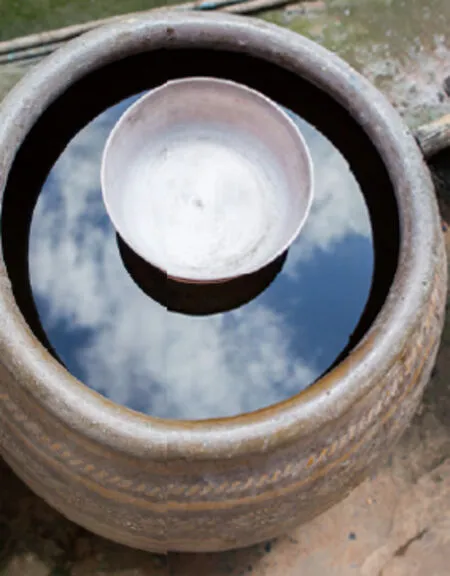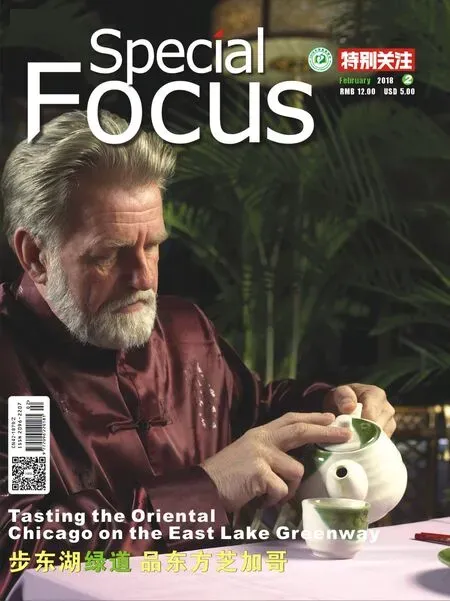The Goodness of the Human Heart
By Zeng Yin
My maternal grandfather was a blacksmith. He was a pure-hearted and hard-working man who did many good deeds throughout his life. My grandma told me that the first good thing he did was to install a large tea kettle in his little workshop. Every morning, he got up early to fire up the kettle and boil some water to make a batch of local aromatic tea plucked from the neighboring Red and White Mountain in Shifang County. Then he prepared some clean ceramic bowls so that the vegetable growers and porters could enjoy tea free of charge.
Actually it was a bit of an imposition to an impoverished laborer like my grandpa, but you may find his reasons for doing this surprising.
At the age of 20, my grandpa was sent down to the countryside to sell ironware door to door. Just imagine how a young twentysomething suffered in the burning heat, schlepping a heavy load on his back through the vast countryside; dying of thirst the whole way. Along the path he spotted a small compound and hurried there to beg for a cup of boiled water from the proprietor who just shook his head and replied there was none to give. My grandfather implored him indicating that any water would do, and that he desperately needed something to drink. An expression of disdain came over the man who replied in a curt tone, “Cold water needs to be carried and warm water needs to be boiled.No one is here to do either of those for you.”
我的外公是个铁匠,一生勤劳、善良。外公一生做过很多好事。据外婆讲,外公做的第一件好事,就是在他的小铁匠铺里安上一个茶桶,每天第一件事就是烧上大桶开水,泡上什邡红白山上独有的山茶,然后放几个洗得干干净净的土碗,任那些赶集的菜农和挑夫们自取自饮。
这是一个贫穷的体力劳动者每天额外给自己增添的事。说起这件事的缘起,更是让人震撼。
外公20多岁时下乡去卖铁器,挑着一担沉重的铁家伙走乡串户,天气又热,担子又重,一时间口渴难忍。见前方路边有一小院,于是上前求主人给他一碗开水。主人摇头说没有。他又求说,冷水也行。主人阴阳怪气地说:“冷水要人挑,热水要人烧,都没有。”
这句话像钉子一样钉进外公的心,让他记了一辈子。赠人一杯茶水,不过是举手之劳。但这家主人,却连这举手的善意,都不愿施予别人,还口出讥讽之语,可谓刻薄之极。
That remark pierced my grandfather straight to the heart, and he never forgot the incident. Giving a stranger a cup of tea takes almost no effort, yet this man, this, “lord of the manor,” couldn’t even be bothered to lift a finger to help;and to add insult to injury, his mocking and insulting tone made his words all the more cutting. It showed how cold and callous a person he truly was.
Different people react differently when suffering insult and indignity. There are two most typical responses:one is to become sullen and resentful, and to spit bitter vitriol back at the world to answer its injustices in kind,and the other is to understand what it means to go through trials and tribulations and to be unwilling to let others suffer the same hardships.My grandfather was scoffed at, rebuked and ill-treated for merely having the nerve to ask for water, he knows all too well what it feels like to be dying of thirst , so he is more than willing to set up the tea-stall out in front of his smithy.
As my grandfather got on in years he once quipped, “They say that people’s morals are going to hell in a hand basket,but I think that this world takes all kinds. There are those like the one I met in the countryside that day who couldn’t be bothered to spare even a cup of water, and there are those like me who give tea freely. When you meet someone like him,you might feel that the world is cruel, that society has gone to the dogs, and that there is no kindness left out there. But when you meet me, you will feel the goodness of humanity and will truly understand that the human heart can be saved.”◆
(From Life is an Individual Journey, Zhejiang University Press. Translation: Chase Coulson)

在经受了刻薄与磨难之后,人们有多种反应,最典型的有两类:其一是变得阴暗,变本加厉地将这份磨难还给世界;另一类,则是知道磨难的可恨,不愿别人再体验和感受那份苦。我的外公,因为讨水而遭人冷眼和讥讽之后,体味到渴者的心情,决定在小小铁匠铺门口摆上一个免费茶摊。
外公晚年说过一句话:人们常说人心不古,其实每个人都是人心。当年那个吝茶者是,我这个施茶者也是。当遇到他时,你就会感到人心不古、世风日下,心生无限悲凉;而当遇到我时,你就会感到世风尚好,人心有救。◆

